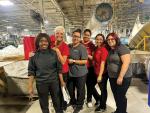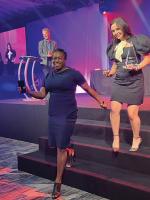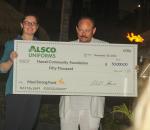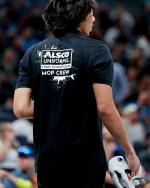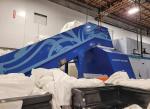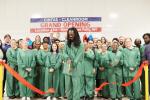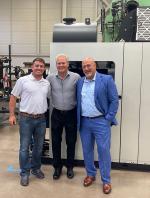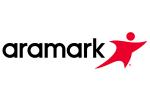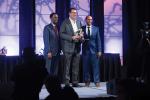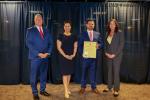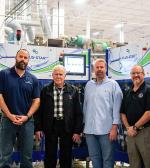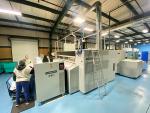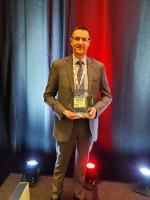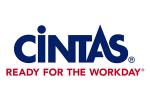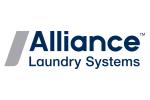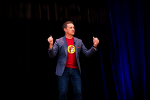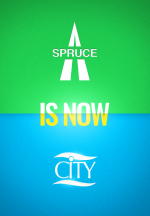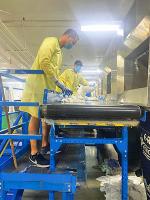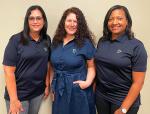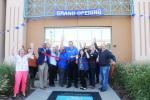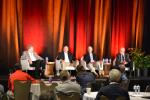CHICAGO — The tight labor market has made hiring new employees challenging in the laundry and linen services industry.
Adding another wrinkle to this is the fact that over the next few years, more people will be reaching retirement age. So, how can operators aid the retirement process and help retain the knowledge and experience of the individual leaving?
American Laundry News spoke with three human resources (HR) experts to get their input on this subject: Barbara Holland, an HR advisor for SHRM, the Society for Human Resource Management; Katie Rowland, human resources manager for Plymate in Shelbyville, Indiana; and Catalina Dongo, vice president of human resources for UniFirst Corp., headquartered in Wilmington, Massachusetts.
What are some things an operation should avoid when filling or “covering” the position?
HOLLAND: Don’t put things off thinking that it doesn’t matter right now, or, we’re busy, I’ll get to this later. Don’t avoid prioritizing this.
You don’t want to be six months away from somebody’s retirement and now starting to think about how am I going to replace this person.
Don’t put it off because you may find yourself in a really challenging place, where now they’re leaving and you don’t have the skills to replace it. That’s going to affect the company’s ability to meet demand or respond to demand.
From what I was reading about the market, it’s expected that this industry is going to be growing for those who want to grow or take on or have the capability of taking on new work. Are they going to be prepared to do that?
ROWLAND: Making a rushed decision when you aren’t prepared. Promoting tenure over skill/knowledge.
DONGO: First, I’d like to offer eliminating the word “covering” from all your vernacular. To me, that means they are just temporality filling in, rather than truly embracing and fulfilling the role and all the responsibilities that come with it.
I’d also say some of the more challenging aspects of filling a position tend to be with bringing in new talent from the outside and cultural assimilation, particularly with higher-level roles.
What I mean by this is, companies must be able to delicately balance the new energies and ideas that come in from the outside, while respecting the history of how a successful company got to where they are today. How we land in that middle ground, pushing ideas forward but honoring the company’s history, is key.
What are some advantages, positives, a company can consider when an employee retires?
HOLLAND: I think in some places, relationships continue even beyond retirement. If you have a good relationship with your organization, people leave and retire, they can still continue to be your brand advocates after they left the organization. If you’re in smaller places, you may run into these people on a regular basis, so there’s still connectivity within the community with those individuals.
So, I think having a little bit longer view of the relationship is important.
Change in our work environment today is very different from it from even five years ago. Usually, we say 10 or 15 years ago, that’s what we compared to, but with COVID, all of a sudden we got thrust into completely different work environments and organizations are still figuring out what that looks like.
How do we respond, and what does our workplace look like going forward? And the new generation of people coming up, how is that going to change the workplace? So, I think there’s excitement in there.
There’s opportunity for fresh eyes looking at how the organization can not only thrive that may have a positive impact on the community around them because the newer generations of people in the workplace.
From a corporate social responsibility perspective, that is very important about what the organization does for the community. I think that there’s a lot that organizations can do in simple ways. That is a shift in the workplace from people retiring who maybe didn’t care as much about those things as your newer generations.
Some or all of those things are going to impact what that workforce looks like, and the question is, is the organization prepared to respond to questions around that? What do you do for your community? What are the things that you’re doing? If organizations aren’t prepared in that work environment of those individuals with those kinds of expectations coming in, it can be a hard time to say how is our workplace going to look like? What’s this going to impact?
We want to be ahead of this. We want to be thinking about this in advance, or we’re going to be responding in a more reactionary way.
ROWLAND: In some cases, it allows a department or company to reevaluate the expectations and accountability of the role. It is easier to make changes with a new coworker vs. an existing one.
DONGO: Retirement is an emotional experience, but it doesn’t have to be scary or negative for either the employee or the employer. It can be a great opportunity for a retiring employee to look at their professional contributions with pride and open a new chapter of personal growth.
For a business, it can mean opportunities to look at your business through a new lens, gain new perspectives, new ways of doing business, to perhaps restructure, or the opportunity be more inclusive and diverse, and this includes diversity of thought, skills, talent, and abilities, as well as cultural diversity.
Any final thoughts to share?
HOLLAND: The one thing that I would add would be considering your different talent pools. I think sometimes we get stuck in how we consider who are going to hire, what we’re looking for. But I do think that there are untapped talent pools that really could bring satisfaction.
So, for example, we have a focus on veterans and second-chance hiring—people who have had criminal records—and people with disabilities. Those are just three that we happen to focus on, but they’re talent pools that I think in some industries, and in the right positions, really can be a win-win for both sides.
DONGO: The best advice I can give to others is to be proactive by creating a solid succession plan for your company. Get in front of it and plan for it.
For the individual retiring, it’s a very emotional time in their lives so be sensitive to that. Communicating with retiring employees is key to understanding their needs.
At UniFirst, we also like to provide retiring individuals with technical support from a total rewards perspective. We work with our outside vendors to facilitate webcasts, seminars, and other online and in-person learning experiences that cover important topics like Medicare, financial planning and other topics to help prepare them for retirement.
Some call retirement an end of an era, but I like to tell people it’s the beginning of a new era in their life. It’s truly bittersweet for both the employee and the employer.
Click HERE to read Part 1 on the status of today’s long-time workers, plus retention and appreciation efforts. For Part 2 on first steps to successfully hire and pass on a retiree’s knowledge, click HERE.
Have a question or comment? E-mail our editor Matt Poe at [email protected].


